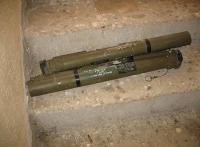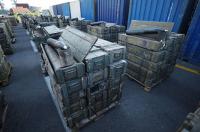-
Intelligence agencies spy on our data by manipulating computer chips
Researchers work to develop mechanisms that will render the Internet of Things more secure. They focus on a specific security gap: the manipulation of computer chips, that is, hardware components. These components can be found not only in PCs and laptops, but also in all other devices with integrated electronics; those include credit cards, cars, and smartphones, as well as large industrial facilities and medical equipment.
-
-
Community policing practices to prevent violent extremism
A new manual designed for police departments identifies a set of promising practices for using community policing to prevent violent extremism. “Creating a comprehensive community outreach program can build the kind of trust necessary to combat violent extremism,” said the manual’s lead author.
-
-
Integrating military, civilian trauma care systems could prevent up to 20% of U.S. trauma deaths
The leading cause of death for Americans under the age of 46 is trauma — a disabling or life-threatening physical injury that results from an event such as a motor vehicle crash, gun violence, or fall. In 2013, trauma cost approximately $670 billion in medical care expenses and lost productivity. Of the 147,790 U.S. trauma deaths in 2014, as many as 20 percent — or about 30,000 — may have been preventable after injury with optimal trauma care. Mass casualty incidents and increasing foreign and domestic threats to homeland security lend urgency to the translation of wartime lessons to civilian trauma systems, says a new report.
-
-
White House: Uranium discovered by IAEA likely tied to Iran’s nuclear weapons program

Obama administration officials concluded that particles of uranium found at Iran’s Parchin military base and revealed in the International Atomic Energy Agency’s final report on the country’s past nuclear activities were likely tied to the regime’s nuclear weapons program. The admission further underscores concerns that the IAEA’s investigation into Iran’s nuclear activities at Parchin should not have been closed following the report’s publication.
-
-
Losing control: The dangers of killer robots
New technology could lead humans to relinquish control over decisions to use lethal force. As artificial intelligence advances, the possibility that machines could independently select and fire on targets is fast approaching. Fully autonomous weapons, also known as “killer robots,” are quickly moving from the realm of science fiction toward reality. While the process of creating international law is notoriously slow, countries can move quickly to address the threats of fully autonomous weapons. They should seize the opportunity presented by the Convention on Conventional Weapons review conference, to be held this December, because the alternative is unacceptable: Allowing technology to outpace diplomacy would produce dire and unparalleled humanitarian consequences.
-
-
Datacasting helps first responders with live video streaming via smartphone

When torrential storms caused widespread flooding in Houston, Texas, in mid-April, first responders needed a way securely to share information amongst their many organizations. Luckily the DHS S&T First Responders Group’s (FRG) datacasting system was available. Datacasting provides public safety users with the capability to transmit secure video and data over existing broadcast television signals to a targeted audience. Even in an emergency situation, where other wireless services often fail due to network congestion, datacasting still provides a reliable platform to quickly send large files.
-
-
Trump calls for profiling of Muslims, surveillance of mosques
Providing more details about his response to the Orlando shooting, Donald Trump on Sunday proposed the profiling of Muslims by law enforcement, and the nation-wide implementing of a Muslim surveillance programs which was used for a while by the NYPD, but which was discontinued after it had failed to yield a single useful lead.
-
-
Tracking, analyzing how ISIS recruits through social media

A team of researchers has developed a model to identify behavioral patterns among serious online groups of ISIS supporters that could provide cyber police and other anti-terror watchdogs a roadmap to their activity and indicators when conditions are ripe for the onset of real-world attacks. The researchers apply the laws of physics to study how terrorist support groups grow online, and how law enforcement can track activities.
-
-
FBI's approach to digital investigations puts security at risk: Expert
A cybersecurity expert argues that the FBI’s recent and widely publicized efforts to compel Apple Computer to write software to unlock an iPhone used by a terrorist in California reflects an outdated approach to law enforcement that threatens to weaken the security of all smartphones, potentially putting the private information of millions of smartphone users at risk and undermining the growing use of smartphones as trusted authenticators for accessing online information.
-
-
The accuracy of the FBI’s face-recognition technology may be improved: GAO
The Department of Justice’s (DOJ) Federal Bureau of Investigation (FBI) operates the Next Generation Identification-Interstate Photo System (NGI-IPS) — a face recognition service that allows law enforcement agencies to search a database of over thirty million photos to support criminal investigations. The GAO examined the FBI’s face recognition capabilities, and the extent to which the FBI’s use of face recognition adhered to privacy laws and policies, and the accuracy of these capabilities.
-
-
Former IDF general: Hezbollah could fire 1,200 rockets daily into Israel during next war

A former IDF general warned Israelis earlier this week that the next war with the Iran-backed Lebanese terror organization Hezbollah would lead to a barrage of rockets into Israel on an order of magnitude higher than anything Israel has yet faced. Major General (res.) Yitzhak Gershon said that the 2006 war between Israel and Hezbollah featured up to 160 rockets per day fired at Israel’s north. But given Hezbollah’s military buildup, “we need to expect up to 1,200 rockets in a day– it will be a completely different scenario from anything we’ve known.”
-
-
Labor MP killed near Leeds by gunman shouting “Britain First!”

Jo Cox, 41, a Labor MP for Batley and Spen, has been shot and stabbed to death Thursday by a man shouting “Britain First!” She was attacked outside a library in the town of Birstall, West Yorkshire. Cox has been campaigning for the United Kingdom to stay in the EU – the referendum on this question is to be held Thursday, 23 June. Britain First, founded in 2011, is a far-right political party campaigning against immigration, multiculturalism, and what it sees as the Islamization of Britain. Members of Britain First conduct what they call “Christian patrols” outside of mosques and the homes of Muslim leaders.
-
-
The Orlando shooting: exploring the link between hate crimes and terrorism

Some are calling the mass shooting at an Orlando gay nightclub an act of terrorism. Others are calling it a hate crime against the LGBT community. President Obama declared it an “act of terror and an act of hate.” Can it be both? The Orlando tragedy demonstrates the importance of exploring difficult questions. For example, are terrorists who commit acts of hate and terrorists who target the government radicalized the same way? Are perpetrators motivated by far-right extremist views similar to those motivated by jihadist extremism? What factors helped push these perpetrators to violence, and what steps can be taken to stop it from occurring again? Answering these questions may help law enforcement identify, investigate, prosecute, and ideally thwart those who seek to turn to violence to achieve their goals.
-
-
Report: Hezbollah has more rockets than 27 NATO countries combined

Any future war between Israel and Hezbollah will take a devastating toll on civilians due to the Iran-backed terrorist group’s practice of embedding its military assets in residential areas, military analysts say. Hezbollah currently has a stockpile of over 130,000 rockets, more than the combined arsenal of all NATO countries, with the exception of the United States.
-
-
New mobile app offers a virtual tour of the Manhattan Project
A new, free mobile application titled “Los Alamos: The Secret City of the Manhattan Project,” is now available for download from the Apple store. The app allows users from any location around the world to experience the environment in that pivotal time during the Second World War when a group of scientists came to Project Y, the wartime-era code name for Los Alamos, to develop a weapon unlike any other in human history — a weapon to harness the power of the atom.
-
More headlines
The long view
How Quickly Could Iran Make Nuclear Weapons Today?
For Iran, two of the three poles in the tent of building nuclear weapons – fissile material and delivery vehicles — are essentially complete. It will take them one week to enrich enough uranium to 90 percent for one bomb (and one month to enrich enough uranium for six bombs). Iran also has a variety of delivery systems, including nuclear-capable missiles: the delivery pole is ready. Weaponization is the pole that needs more work. The accelerated weaponization program can be accomplished in a matter of six months.
Fifty-Five Hours of Risk: The Dangerous Implications of Slow Attack Attribution
Assuming that its foreign adversaries’ recent violent threats are to be taken seriously, and that the likelihood of a direct attack against the United States is, if not on the rise, at least significant enough to warrant serious attention, the United States has an urgent mandate to prepare effective cognitive defenses. Foremost among these is the ability to quickly and accurately attribute attacks to their originators, and to deliver that information to the public through a trustworthy vehicle.
What Can We Learn from the Nation’s Historic Decline in Murders?
The U.S. endured a spike in gun violence during the pandemic, but it’s subsiding in many places. A researcher puts the latest homicide statistics into context — and warns lawmakers not to become complacent.
Is Left-Wing Terrorism Making a Comeback in Germany? Analyzing the “Engel – Guntermann Network”
For Germany, the reemergence of more violence orientated left-wing extremist actors has diversified the threat posed by non-state actors even further. Violent left-wing extremism is also of growing concern across Europe. While left-wing violent extremism does not currently represent as acute a threat as currently manifested by jihadist and right-wing terrorist attacks, the recent concerning trend among German left-wing extremists is toward greater violence and transnationalism.
Saving Seconds, Saving Lives: NIST-Funded Challenge Crowns Winners in 3D Tracking Technology
NIST has awarded $1.9 million to six teams for innovative 3D tracking solutions in the final phase of a competition. The winning designs combine localization and biometric monitoring, using sensors affixed to first responders’ equipment. This competition is part of an $8 million NIST-funded initiative to address first responders’ need for improved tracking in emergency settings where GPS falls short.
For First Responders, Communication with Their Teams is Essential
When a first responder enters a building during an emergency, they count on being able to communicate with their team at all times. Their safety and their ability to carry out the mission relies on knowing they can reach help and support anywhere that they need to go within a structure.
